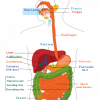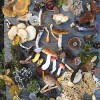Posts tagged mutation

Jumping Down the Road to Cancer.
Aug 28th
Lying dormant in our genomes are millions of jumping genes. Originally discovered by Barbara McClintock, transposons are DNA sequences that can move from one location to another in our DNA. Transposons cause mutations when they jump to new locations, so keeping them from jumping is important. However, although transposons are largely silent, every person probably has a few “rare” sites, found in only a few people in the world, where a transposon has jumped to a new location.
Mutations in numerous pathways need to accumulate for cancer to progress. Given the ability of transposons to cause mutation and the role of mutation in More >

Guts against Diabetes
Mar 21st
For a very long time I have been using Diabetes as an example of a disorder that is caused by a mutation in the insulin gene. This mutation would stop the cells from making insulin, and a diabetic might need daily insulin injections to regulate their sugar levels properly. I don’t know what took me so long to realize that this was completely wrong. That while some diabetics are insulin dependent, it is because their insulin-producing cells of the pancreas are being completely destroyed by the immune system. And while they still aren’t sure about why these cells are being More >

Rhythm of the Night
Sep 8th
Circadian rhythms, or cycles of activity during a 24 hour period, are highly conserved across species. While we have much to learn about these daily patterns of life, scientists have found an organism that may offer new insight.
The timing of this internal clock is related to the amount of exposure to light. How do circadian rhythms work in organisms that are not exposed to light? A Somalian cavefish, Phreatichthys andruzzii, is a blind species that has been living without light for approximately 1.4 to 2.6 million years!
Researchers compared the cave fish to zebrafish during exposures to 12 hour period of More >

Diverse Proteins
Oct 14th
The instructions for life are carried in the DNA of our cells. All day long, our cells read the information in our DNA and make proteins. While DNA contains recipes for how life works, proteins are molecules that I consider the “doers” in our cells.
Protein is a broad category that includes enzymes and hormones. When you eat an apple, your body produces enzymes to break down that apple and build new products for your body. If you have a lot of glucose (a type of sugar) in your blood, the cells in your pancreas will read the gene for insulin More >

Sleep Science
Sep 30th
Have you ever wished there were more hours in the day? I know someone who insists on extending his days by consuming energy drinks. In his opinion, sleeping is a waste of precious time. Unfortunately, for most humans, 8 hours of sleep is required to function properly. Some people can manage with far less sleep, which for those of us who really NEED 8 hours of shut-eye, is hard to imagine. For me, sometimes it seems even 8 hours doesn’t suffice, which is evidenced by my morning alarm-snooze-alarm-snooze routine, and my sofa sleeping habit in the evenings.
In an August article More >
